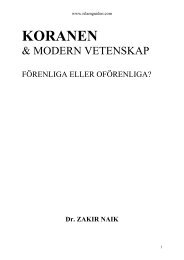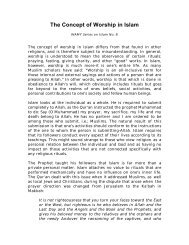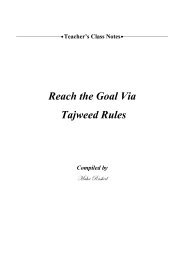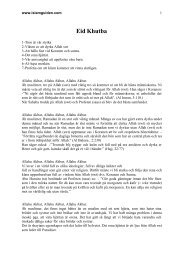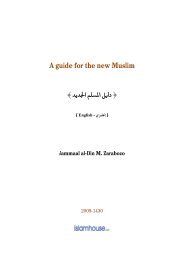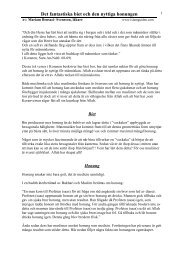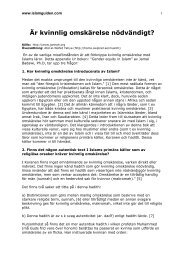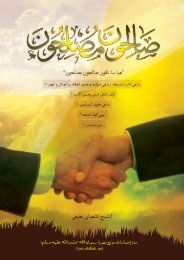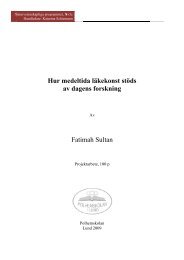The Prophet's Prayer From The beginning To The End As Though ...
The Prophet's Prayer From The beginning To The End As Though ...
The Prophet's Prayer From The beginning To The End As Though ...
You also want an ePaper? Increase the reach of your titles
YUMPU automatically turns print PDFs into web optimized ePapers that Google loves.
the eyes of the one finding fault, how can you accuse the latter of insulting him! <strong>The</strong>re is doubt that<br />
this type of accusation is baseless and anyone who makes it must retract it: otherwise it is he who is<br />
insulting Muslims, not just ordinary individuals among them, but their great Imaams among the<br />
Companions, Successors the subsequent Mujtahid Imaams and others. This is because we know for<br />
sure that these illustrious personalities used to fault and refute each other 16 ; is it reasonable to say,<br />
"<strong>The</strong>y used to insult each other" No! In fact, it is authentically-reported that the Messenger of Allaah<br />
(sallallaahu 'alaihi wa sallam) himself faulted Abu Bakr (radi Allaahu 'anhu) in his interpretation of a<br />
man's dream, saying to him, "You were right in some of it and wrong in some of it" 17 - so did he<br />
(sallallaahu 'alaihi wa sallam) insult Abu Bakr by these words!<br />
One of the astonishing effects this misconception has on its holders is that it prevents them from<br />
following the Sunnah when it is different to their Madhhab, since to them practising it means<br />
insulting the Imaam, whereas following him, even when contrary to the Sunnah, means respecting<br />
and loving him! Hence they insist on following his opinion to escape from this supposed disrespect.<br />
<strong>The</strong>se people have forgotten - I am not saying: ... pretended to forget - that because of this notion,<br />
they have landed in something far worse than that from which they were fleeing. It should be said to<br />
them, "If to follow someone means that you are respecting him, and to oppose him means that you<br />
are insulting him, then how do you allow yourselves to oppose the example of the Prophet<br />
(sallallaahu 'alaihi wa sallam) and not follow it, preferring to follow the Imaam of the Madhhab in a<br />
path different to the Sunnah, when the Imaam is not infallible and insulting him is not Kufr! If you<br />
interpret opposing the Imaam as insulting him, then opposing the Messenger of Allaah (sallallaahu<br />
'alaihi wa sallam) is more obviously insulting him; in fact, it is open Kufr, from which we seek refuge<br />
with Allaah!" If this is said to them, they cannot answer to it, by Allaah, except one retort which we<br />
hear time and time again from some of them: "We have left this sunnah trusting in the Imaam of the<br />
Madhhab, and he was more learned about the Sunnah than us."<br />
Our answer to this is from many angles, which have already been discussed at length in this<br />
Introduction. This is why I shall briefly limit myself to one approach, a decisive reply by the<br />
permission of Allaah. I say:<br />
"<strong>The</strong> Imaam of your Madhhab is not the only one who was more learned about the Sunnah than you:<br />
in fact, there are dozens, nay hundreds, of Imaams who too were more knowledgeable about the<br />
Sunnah than you. <strong>The</strong>refore, if an authentic sunnah happens to differ from your Madhhab, and it<br />
was taken by one of these other Imaams, it is definitely essential that you accept this sunnah in this<br />
circumstance. This is because your above- mentioned argument is of no use here, for the one<br />
opposing you will reply, 'We have accepted this Sunnah trusting in our Imaam, who accepted it' - in<br />
this instance, to follow the latter Imaam is preferable to following the Imaam who has differed from<br />
the Sunnah."<br />
This is clear and not confusing to anyone, Allaah Willing.<br />
Because of all of the above, I am able to say:<br />
Since this book of ours has collected the authentic sunnahs reported from the Messenger of Allaah<br />
(sallallaahu 'alaihi wa sallam) about the description of his <strong>Prayer</strong>, there is no excuse for anyone to not<br />
act on it, for there is nothing in it which the scholars have unanimously rejected, as they would never<br />
do. In fact, in every instance several of them have adopted the authentic sunnah; any one of them<br />
who did not do so is excused and rewarded once, because the text was not conveyed to him at all, or<br />
it was conveyed but in such a way that to him it did not constitute proof, or due to other reasons<br />
which are well-known among the scholars. However, those after him in front of whom the text is<br />
١٧



